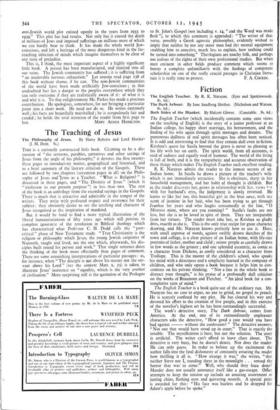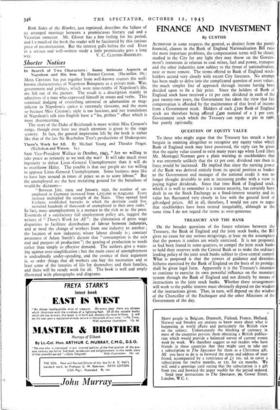Fiction
Both Sides of the Blanket. By Halcott Glover. (Constable. _8s. 6d.)
The English Teacher (which incidentally contains some sane views on the teaching of English) is the story of a junior professor at an Indian college, his happy short marriage, his bereavement, and the finding of his wife again through spirit messages and dreams. The portentous dullness of real spirit messages has often been noticed. It is odd and interesting to find that they remain dull even in fiction. Krishna's quest for Susila beyond the grave is never so pleasing as his life with her on earth. The spirit world, from all accounts, is void of sadness and equally void of humour. The world of the living is full of both, and it is the sympathetic and accurate observation of these things which makes The English Teacher such excellent reading.
R. K. Narayan admits the reader to the inmost secrets of an Indian home. In Susila he draws a picture of the teacher's wife, which is not immediately attractive. She is obstinate, sharp in her household management, and her habit of thought is childish. But as the reader discovers her, grows in relationship with her, views 1,-r With her husband's eyes, the judgement is slowly reversed. He learns to like her too, this 'beautiful girl in the blue saree, with the scent of jasmine in her hair, who has been trying to get through Ivanhoe for years and who laughs consumedly at the line, " 0 Mistress mine, where are you roaming? " Susila's faults are not less, but she is to be loved in spite of them. They are inseparable from her virtues. The reader must take her, as Krishna so gladly does, exactly as she is. This is the only true recipe for great character drawing, and Mr. Narayan knows perfectly how to use it. Here, with small expense of words, against swiftly drawn sketches of the town and college, is a clear picture of an Indian home, with life-size portraits of father, mother and child ; minor people as carefully drawn in few words as the greater ; and one splendid eccentric, as comic as a character from Dickens, as coolly considered as a character from Trollope. This is the master of the children's school, who speaks his mind with a directness ancrit simplicity learned in the company of children, and who only opens a book because it helps him to con- centrate on his -private thinking. " Not a line in the whole book to distract your thought," is his praise of a profoundly dull criticism on the works of Beaumont and Fletcher. " An ideal book for a con- templative turn of mind."
The English Teacher is a book quite out of the ordinary run. Mr. Narayan has no case to argue, no axe to grind, no gospel to preach. He is scarcely confined by any plot. He has cleared his way and devoted his effort to the creation of live people, and in this exercise of the novelist's highest art he has been outstandingly successful.
The week's detective story, The Dark Arbour, comes from America. At the end, one of its extraordinarily unpleasant characters asks the detective, "How good a case would you have had against - without the confession? " The detective answers, "Not one that would have stood up in court." That is exactly the trouble. The mystification is here, but not the solution. The story is artificial. The writer can't afford to leave clues about. The detective is very busy, but he doesn't detect. Nor does the reader. He can only guess. In order to bolster up the excitement the author falls into the fatal dishonesty of constantly assuring the reader how thrilling it all is. " How strange it was," she writes, " that neither Steve nor I, standing there in the moonlight . . . sensed the horror that was to come." Well, why should they hue done? Murder does not usually announce itself like a gas-escape. Oiler attempts to keep the tension up include an amazing assortment of jutting chins, flashing eyes and quivering nostrils. A special prize is awarded for this: "His face was hueless and he dropped his Adam's apple before he spoke." Both Sides of the Blanket, just reprinted, describes the failure of an arranged marriage between a promiscuous literary cad and a Victorian innocent. Mr. Glover has a fine feeling for his period, and for much of the book the reader will be fascinated by this curious piece of reconstruction. But the interest palls before the end Even in a serious and well-written study a little promiscuity goes a long



























 Previous page
Previous page